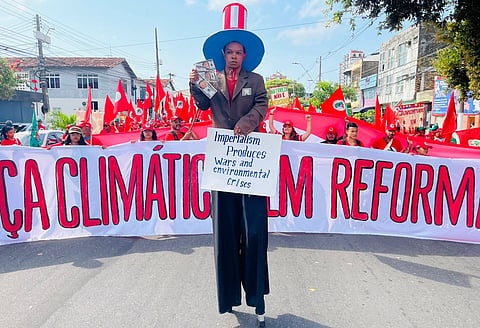

The number of fossil fuel lobbyists at Parque da Cidade, the site of the 30th Conference of the Parties (COP30) to the United Nations Framework Convention on Climate Change (UNFCCC), has risen to a record high compared to earlier global climate summits, data shows.
“New analysis reveals more than 1,600 fossil fuel lobbyists have been granted access to the COP30 climate talks in Belém, marking yet another year of overwhelming industry presence at crucial climate negotiations,” pointed out the Kick Big Polluters Out (KBPO) coalition, that prepares the data.
“Proportionally, this is a 12 percent increase from last year’s climate talks in Baku, Azerbaijan, and is the largest concentration of fossil fuel lobbyists at COP since KBPO started analysing conference attendees,” the coalition further said.
While activists allege that such a high number of lobbyists are present to dwarf the voice of the most vulnerable countries and influence negotiations, the oil lobby counters the narrative claiming that the presence is required for engaging on the issue and finding a long-term solution.
The KBPO data revealed that with one in every 25 participants in Belém representing the fossil fuel industry, fuel lobbyists significantly outnumbered almost every country’s delegation at COP30, with only host nation Brazil (3,805) sending more people.
“It’s common sense that you cannot solve a problem by giving power to those who caused it. Yet three decades and 30 COPs later, more than 1,500 fossil fuel lobbyists are roaming the climate talks as if they belong here. It is infuriating to watch their influence deepen year after year,” said Jax Bonbon, a member from KBPO. He alleged that the trend was “making a mockery of the process and of the communities suffering its consequences”.
A representative from the oil industry however chose to counter the narrative. “We all understand the global emissions status and role of fossil fuel burning in the process. But you cannot solve the problem overnight and needs a thorough discussion,” pointed out the official without wanting to be named.
Activists, however, claimed that the presence of the oil lobby is not merely “to discuss the problem, but to influence the negotiations” and quoted figures to substantiate their claim. “Fossil fuel lobbyists outnumber official delegates from the Philippines by nearly 50 to 1, even while the country is being hit by devastating typhoons as the UN climate talks are underway, while the number is more than 40 times the number of people from Jamaica, which is still reeling from Hurricane Melissa,” they pointed out.
KBPO analysed the provisional list of participants at COP30 in detail and their findings have been quite revealing:
● Fossil fuel lobbyists have received two-thirds more passes to COP30 than all the delegates from the 10 most climate vulnerable nations combined (1,061).
● Major trade associations remain a primary vehicle for fossil fuel influence, with the International Emissions Trading Association bringing 60 representatives, including delegates from oil and gas majors
● Behind-the-scenes access also remains a major channel for influence, with approximately 599 lobbyists gaining access through Party overflow badges that allow the individuals access to the inner workings of the negotiations.
● Several Global North countries included fossil fuel representatives within their official delegations — France brought 22 fossil fuel delegates, with five from TotalEnergies, including CEO Patrick Pouyanné; Japan’s delegation contained 33 fossil fuel lobbyists; and Norway has pushed 17 into the talks, including six senior executives.
● Although attendance at COP30 is smaller overall than COP29 in Baku and COP28 in Dubai, the proportion of fossil fuel lobbyists has increased to nearly 1 in every 25 delegates present in Belem, the highest ever.
Experts this correspondent spoke to, expressed divergent views on the matter.
“More than 1,600 fossil fuel lobbyists have been granted access to the COP30 climate negotiations in Belém. This is significant. They need to be part of the negotiations and their increasing presence in the COP30 is a welcome move. It shows a greater amount of sensitivity. In any case, climate action is a global public good, and it needs concerted efforts from all. The fossil fuel lobby, one of the most significant stakeholders in the climate game, cannot be left out,” Nilanjan Ghosh, head of thinktank ORF Kolkata
A senior UNFCCC official, quizzed on the dominance of oil lobbyists at the COP30 venue, sought to transfer the responsibility on countries and observer groups. “The onus is on the Parties and observer groups to nominate the representatives, and we have no role,” said the official claiming that the COP30 Presidency is most transparent about the documentation of the delegates.
“The record-breaking number of fossil fuel lobbyists at COP30 in Belém aren’t just attending; they are a clear sign of a hostile takeover of these talks. They have turned the climate summit into a trade show for polluters, and it perfectly exposes the toxic nexus between these corporations and the governments promoting them. This is precisely why the Paris Agreement is failing to deliver a just and equitable fossil fuel phase-out. For three decades, we’ve seen no concrete progress for one reason: the undue influence of these companies, who are literally invited onto official country delegations to weaken the outcome from the inside,” said Harjeet Singh, a frontline climate activist.